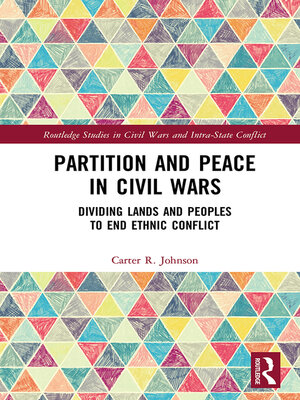Partition and Peace in Civil Wars
ebook ∣ Dividing Lands and Peoples to End Ethnic Conflict · Routledge Studies in Civil Wars and Intra-State Conflict
By Carter R. Johnson

Sign up to save your library
With an OverDrive account, you can save your favorite libraries for at-a-glance information about availability. Find out more about OverDrive accounts.
Find this title in Libby, the library reading app by OverDrive.



Search for a digital library with this title
Title found at these libraries:
| Library Name | Distance |
|---|---|
| Loading... |
This book examines whether partition is an effective means to resolve ethnic and sectarian civil wars. It argues that partition is unlikely to end ongoing ethnosectarian civil wars, but it can increase the likelihood of preventing civil war recurrence, as long as the partition separates civilians and militaries. The book presents in-depth case studies of Georgia–Abkhazia and Moldova–Transnistria, in addition to cross-national comparisons of all ethnosectarian civil wars between 1945 and 2004. This analysis demonstrates when partitioning a country can help transform an identity-based civil war into a lasting peace. Highlighting practical and moral challenges of separating ethnosectarian groups, the book contends that complete partitions cannot be easily implemented by the international community, and this limits their applicability. It also demonstrates that ethnosectarian civil wars are driven less by inter-group antagonisms and more by state breakdown, meaning displaced minorities can reintegrate peacefully after partition as long as a minimal level of state-building has been completed. The book ends by examining whether partition would be useful for five contemporary conflicts: Iraq, Ukraine–Donbass, Afghanistan, Sudan–South Sudan, and Serbia–Kosovo.
This book will be of much interest to students of civil wars, ethnic conflict, peace and conflict studies, and international relations.







